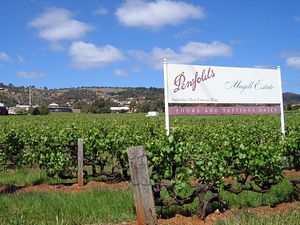Gone are the days when designer handbags and watches dominated the counterfeit market in China. Today, Chinese companies are becoming innovative, manufacturing fake goods for global consumers in a growing number of industries. The famous Barossa Valley wines, sourced in Australia, have become the latest target.
The Australian business community has generally been able to maintain close ties to China, despite Canberra and Beijing experiencing growing strain on their once-strong relationship. Australian Prime Minister Malcolm Turnbull and Foreign Minister Julie Bishop have generally taken a hard line against China, arguing that Beijing is attempting to influence the Australian political system.
But as growing numbers of counterfeit Australian goods flood Chinese markets, there is growing uncertainty on what actions Canberra and affected Australian industries can take.
Most recently, fake wines labelled as “Benfords” have cropped up on Pinduoduo, China’s third largest e-commerce platform. The Chinese counterfeit wine industry continues to grow; cheaper wines have the potential to challenge legitimate wines on the Chinese market and already rake in high profits. The “Benfords” wine appears to copy Penfolds wine, a legitimate brand owned by Treasury Wine Estates.
Pinduoduo has taken the e-commerce industry in China by storm, growing rapidly in relation to established corporations such as Alibaba. Although only three years old, the company gained media fame after appearing on the Nasdaq with a value of $24 billion. The model of the company heavily relies on social media, allowing for high discounts in exchange for product listings.
The surge in counterfeit wine in Chinese markets has prompted a response by Beijing. In March 2018, an estimated 50,000 fake Penfolds bottles were seized by the authorities. In late 2017, a further 14,000 bottles were seized.
In addition to wine, the Australian beef industry has become the target of Chinese counterfeiters. Although Australian beef is sealed in a cryovac bag with a plastic insert, the technique has been copied in China. In May 2018, another $4.67 million worth of other goods were seized, many of them counterfeit Australian goods.
Although China has attempted to crackdown on counterfeiting, the industry continues to grow. Chinese counterfeits, including those in Hong Kong, make up almost 84.5 percent of the global counterfeit industry. The International Anti-Counterfeiting Coalition estimates the industry is worth $1.7 trillion.
The global nature of the industry makes combating the trade of counterfeit goods difficult. Domestically, Australia can impose export restrictions on counterfeits; in 2015-16, the Australian Border Force seized more than 190,000 counterfeit goods worth almost $12.59 million. Wine Australia, the government authority that regulates Australian wine, has also received new powers to disallow shipments of wine and cancel or suspend licenses. But this doesn’t impact on foreign companies counterfeiting Australian goods.
To combat the counterfeiting of Australian goods overseas, Canberra can only rely on cooperation with other states. For this reason, ending the counterfeit of Australian goods requires cooperation with Beijing.
To date, China has taken several steps to combat the counterfeiting industry. Beijing has plans to introduce a new e-commerce law, which would mean that merchants no longer have the sole responsibility for the sale of counterfeit goods.
The State Administration for Market Regulation in China also called for an investigation into Pinduoduo, which prompted the company to initiate more stringent product vetting. Last year, they allegedly removed 10.7 million suspected goods and banned merchants involved in the illicit industry. Despite being placed on a black-list by the United States in January 2018, Alibaba also claims to be pushing back against the prevalence of counterfeit goods on its platform.
Despite regulatory attempts, local authorities remain in charge of adhering to national statutes. Corruption will continue to plague efforts to enforce regulations in many of its provinces. This poses a problem for Australian industries seeking government support for ending the counterfeiting of their products.
In 2017 alone, meat, other food preparations, and beverages exports to China were approximately $2 billion, but the growing counterfeit industry in China has the potential to decrease Chinese consumption of certain Australian consumer goods.
While the potential decline in overall trade would be small considering that Canberra has generally relied on the export of raw materials to Beijing, consumer industries that have benefited from exporting to China may suffer.
At the same time, it has been reported that legitimate wine sales to China have decreased. Allegedly, delays in wine delivery are growing as “certificate of origin” checks become more stringent. Winemakers in particular have become nervous about the unfolding relationship between Australia and China.
The industries impacted by the counterfeit industry might decide to lobby the Australian government to take a harder line on Beijing, especially if legitimate sales continue to face hurdles.
Attempts to counter the counterfeit industry may have prompted U.S President Donald Trump to engage in a trade war with China, but Canberra is too reliant on Beijing to do the same. Further, trade wars would only damage the global fight against counterfeits.
Instead, Canberra can only continue to put pressure on Beijing or wait until Beijing ramps up its own war on counterfeits in an attempt to protect Australian consumer industries. Beyond that, the response to the counterfeiting of Australian goods may have to depend on the actions of the affected industries, despite attempts already being made through QR codes and etches on bottles to protect the industry. The emerging controversy shows that the consumer industry’s influence on the Australia-China relationship may grow still further in the future, with potentially significant implications for ties.
Matthew Abbey is an Australian journalist and political commentator currently based in Paris.

































